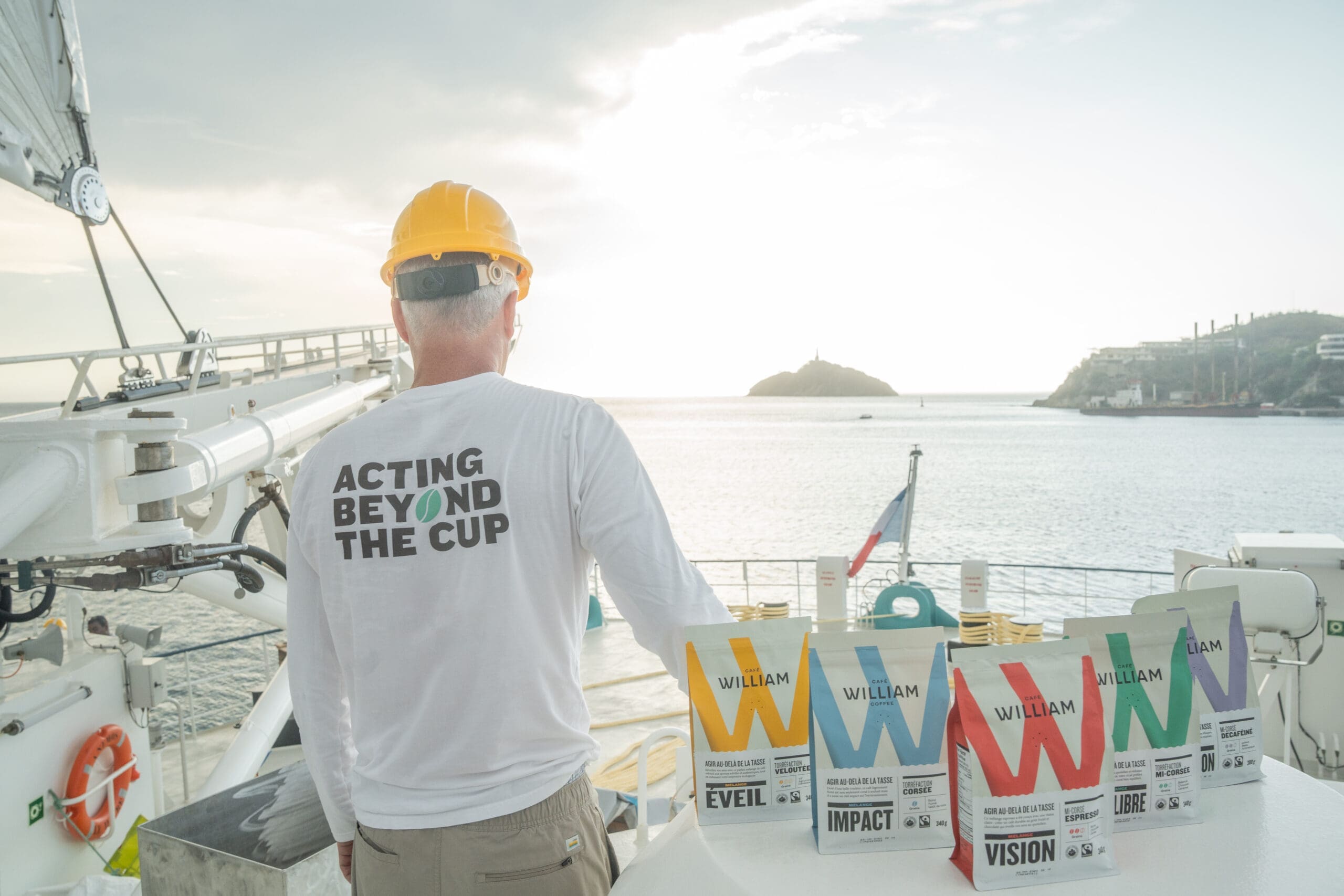In an innovative move toward sustainability, Québec-based coffee roaster Café William has partnered with TOWT, the largest sail-powered cargo ship of the 21st century, to transport green coffee beans from Colombia to Québec. This unique collaboration, which involves the transport of 50 shipping containers of beans, highlights Café William’s commitment to eco-friendly practices. The beans, including those from the ANEI cooperative, will be featured in the brand’s Limited Edition Wind Series, launching in Costco stores this November. We spoke with Serge Picard, chief innovation and commercial officer, to learn more about this groundbreaking initiative. —Vita Daily
What inspired Café William to partner with TOWT and adopt wind-powered sailing cargo ships for transporting coffee beans?
We have always been committed to producing organic, fairtrade coffee that acts beyond the cup, but this journey began in 2020 with our first sailboat investment. The idea came up while we were discussing the future of the company. Overall, the decision to opt for wind-powered transport stems from our drive to reduce Café William’s environmental footprint and promote sustainable practices throughout the entire supply chain.
Can you describe the environmental impact of this new transportation method, and how it contributes to Café William’s sustainability goals?
We are united with TOWT in our goal to decarbonize the supply chain, and in particular maritime transport. Sailing on TOWT is planned to produce the following benefits.
- 90 % less CO2
- 98 % less sulphur oxides
- 92 % less nitrogen oxides
- 100 % less methane
- Less disruptive to marine life.
The carbon footprint of a sailing cargo ship is less than 2g/km/T transported compared to the carbon footprint of a container ship, which is about 20.2g/km/T transported. As the first TOWT sailing cargo ship voyage to Canada, this marks a new era for maritime transport, leading the way for other Canadian CPG companies who are on a mission to reduce their carbon footprint to follow suit.
How does this inaugural voyage with TOWT compare to the trial voyage in December 2023 in terms of capacity and operational efficiency?
In December 2023, we demonstrated our initiative to act beyond the cup through the inaugural voyage of a cargo sailboat, transporting beans from Santa Marta, Colombia through the USA (Philadelphia) then to our facility in Sherbrooke Canada. This year, we are proud to announce the voyage of a second sailing cargo ship that departed Colombia in September 2024, carrying 1 million kilograms (the equivalent of 50 shipping containers) of green coffee – ten times more than the first voyage.
What role does the ANEI cooperative play in your supply chain, and why is it important to source coffee beans from Indigenous, Fairtrade, and organic-certified farmers?
Fairtrade-certified coffee beans come from farms where the workers are treated humanely and receive a fair return for their product. Organic coffee beans are produced in a balanced ecosystem, free of pesticides, chemicals and herbicides. This doesn’t only benefit the final product, but also the farmers and surrounding communities by keeping these harmful products out of their air, earth and water.
The beans aboard the TOWT come from the ANEI cooperative, an organization that aims to rebuild and strengthen Colombia’s Indigenous communities, culture and economic resilience after decades of decline. We have always been committed to sourcing organic, fairtrade coffee and supporting the local communities where our beans come from. The ANEI cooperative ensures this commitment is being filled where we don’t have boots on the ground.
With the introduction of the world’s first 100% electric industrial coffee roaster at your Québec facility, how do you see Café William leading innovation in sustainable coffee production and roasting?
When we were sourcing roaster equipment for our new plant, we turned to electricity over natural gas. To our surprise, there weren’t any electric roasters readily available for sale, so we worked with Neuhaus Neotec to create our very own.
Our electric roaster is tangible proof that if you approach a challenge with enough conviction, anything is possible. All new ideas have to come from somewhere, and nearly every modern technology was once believed to be impossible or impractical, which is an attitude we hope to see our industry embrace.
Looking ahead, do you anticipate expanding the use of sailing cargo ships for other product lines, and how do you envision this setting a precedent for other companies in the food and beverage industry?
We are proud to be supporting TOWT in their mission to decarbonize maritime transport through the use of wind-powered cargo ships and are confident that their operations will continue to grow. As a relatively new concept in the modern industrial world, cargo sailboats are in limited supply and aren’t yet able to carry the same volume of product that their fossil fuel counterparts can. We would love to one day be able to rely solely on wind-powered cargo sailboats, but because we source our beans from several different countries (ie. Indonesia and other countries in Asia and Africa) it is difficult to determine exactly when new clean sail cargo routes will open up for these origins.
With that said, we’re hopeful about the potential of our partnership with TOWT and have just made a deal with the company to partner for 21 additional voyages over the next seven years. We have the ultimate goal to eventually transport cleanly 100% of our commodity coffee needs as well as finished products ready for distribution.
How do you take your coffee?!
I love my morning strong double espresso with a tad of milk and a dab of maple syrup. In the afternoons I’ll switch it up – anything goes, from cold brew to cappuccino or specialty drip.

Be the first to comment